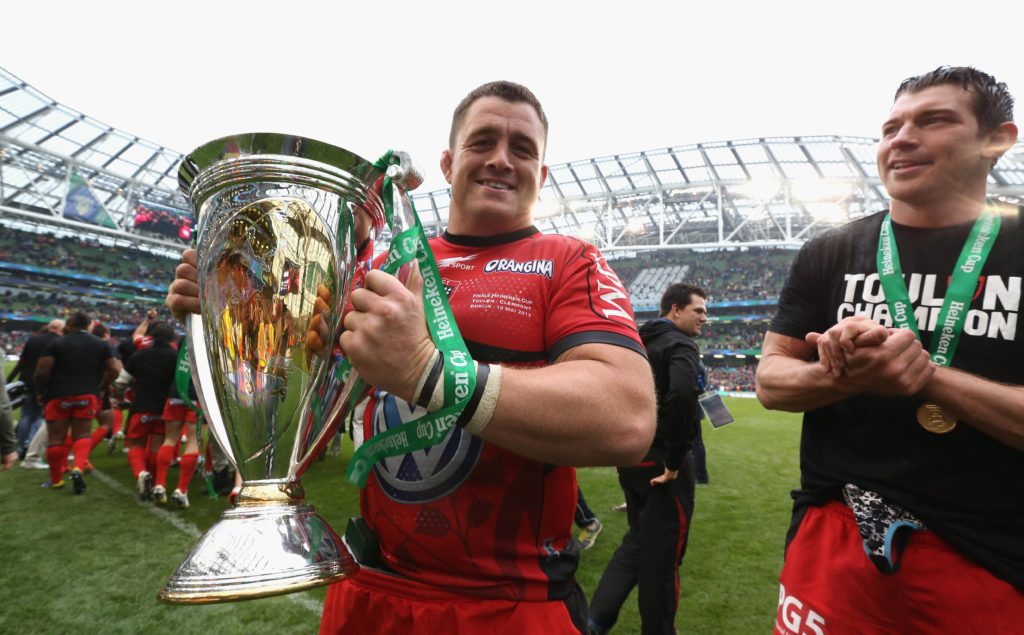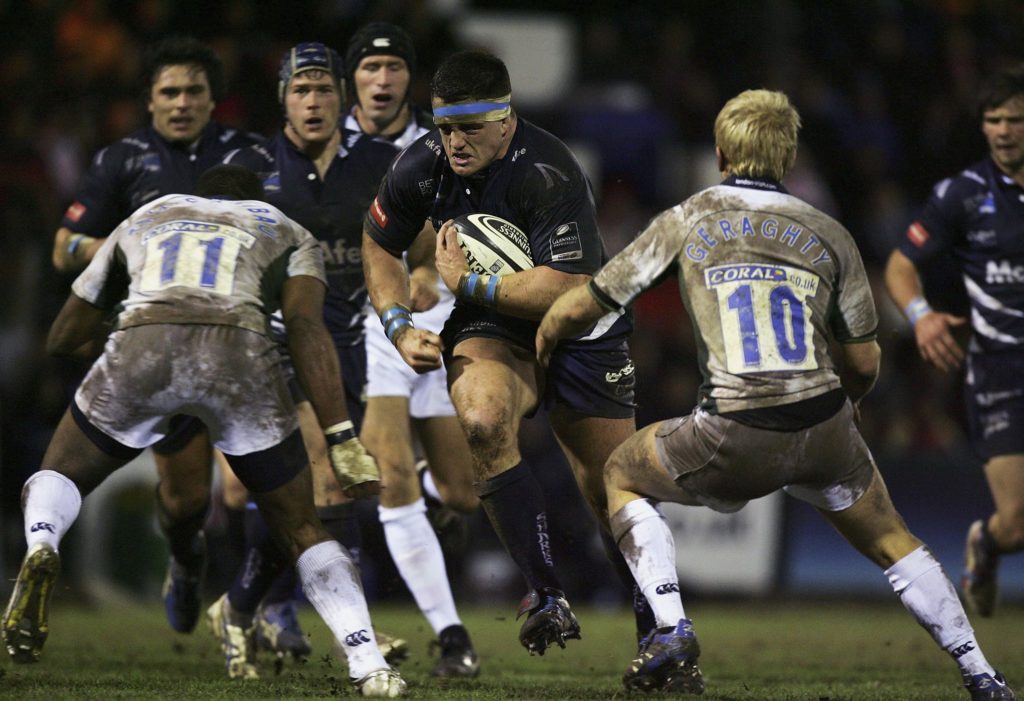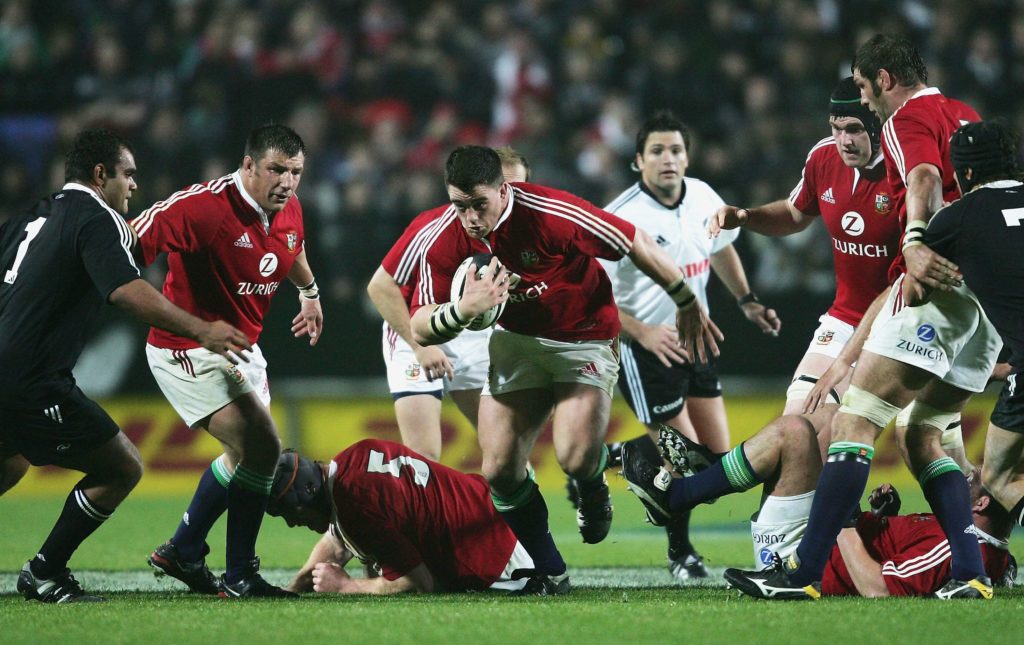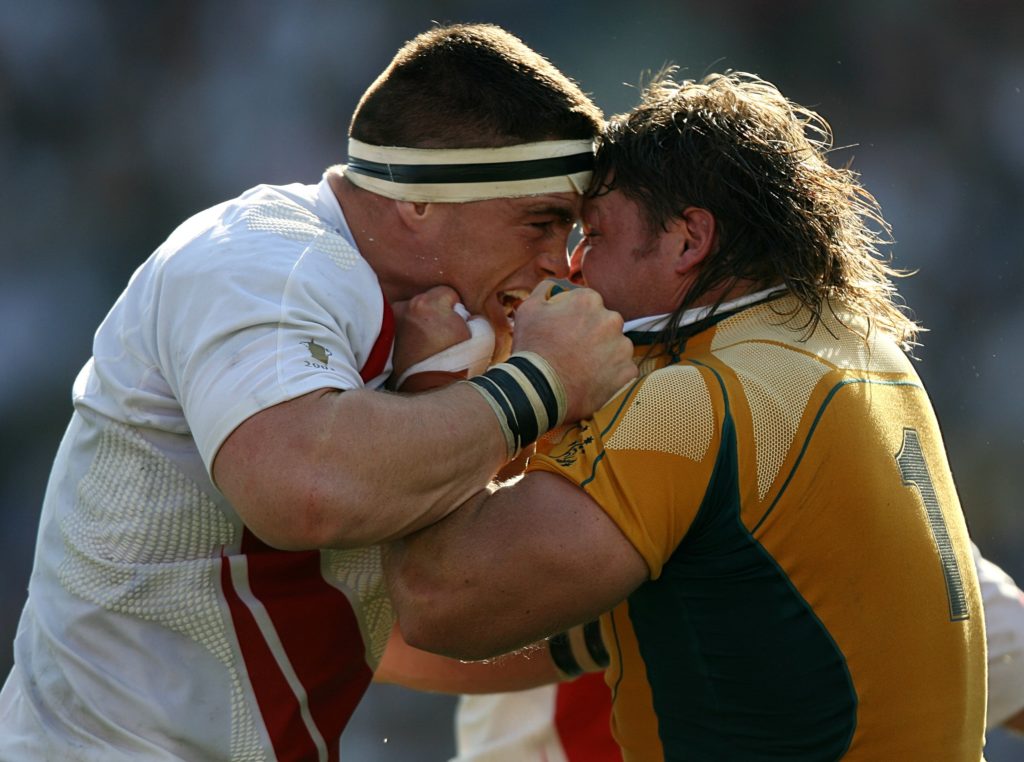When rugby fans talk about the strongest men ever to play the game, one name will routinely pop up; Andrew Sheridan. ‘Sheri’ or ‘Big Ted’ as he’s widely known, was revered for his exploits in the gym where some sages say he could have competed on an international stage. Not much has been seen of the former England loose-head since he departed these shores in 2012, destined for Toulon. For two seasons he rubbed shoulders with the game’s superstars, lifting the Heineken Cup in 2013, before being forced to retire a year later with a neck issue at 34. After that, apart the odd interview, he largely disappeared from the public domain.
After a little digging through his old school-mate David Flatman and the France-based Johnnie Beattie, contact details were unearthed and a Zoom call set up.
Wearing a grey T-shirt with a Tyson graphic, the first thing you notice about Sheridan are his forearms. They are the size of most men’s legs. A bull-like neck gives you further visual clues as to the interviewee’s former profession.
So why, seven years after retiring, is Sheridan still down in the south of France, in a small village called Carqueiranne? “Well”, he says, pointing. “The beach is 200m that way, and a small forest is 200m that way, where you can climb 300m and get some great views of the coast.” With a daughter, Catrin, who is bilingual, the Sheridans are aiming to stay until she finishes her schooling. “In normal times, we have a lodge in Builth Wells where we’d flit back and forth, because Siwan, my wife’s father, is nearby in Llandrindod Wells but that’s not been possible.”
The calming sea breeze of the Mediterranean and obsessive fan culture of a rugby hotbed seems to agree with Sheridan, who is easy company. “Everyone around here is a proud Toulonnais. The fans remember you so when you go to the charcuterie, they’ll say, ‘Sheri, did you watch the game?’ and by that, they don’t mean France, they mean Toulon. They’re so proud of their roots, their town and those who have represented it. Round here, you’ll see big advertising boards with Eben Etzebeth flexing his muscles for local butchers, rather than pictures of the French team.”

With the generous state benefits afforded him for two years after retiring, Sheridan spent his time studying for his Level 4 diploma in WSET (Wine & Spirit Education Trust), which keeps him ticking over as a wine merchant.
The 41-year-old, who spent nine years in Manchester with Sale Sharks, admits the constraints of the pandemic have meant business is sleepy, for now. “I’ve done precious little since lockdown. You can’t travel. Before, I did a few wine events and worked in a wine shop down the road but for the time being, it’s hunkering down and concentrating on our daughter and her schooling.”
As for whether he keeps in touch with the ex-pat rugby network, Sheridan has a playful dig at an old sparring partner. “I’m as sociable as Julian White,” he chuckles, before disclosing that their spouses are still in touch on Facebook. “Let me think, I know Simon Shaw is not that far away and Bobby Stridgeon’s family are just down the road. Listen, the way I see it, I had my time. I never had an ego with my career anyway. People move on and you get forgotten about. Injuries curtailed things a bit but I can’t complain. If an opportunity came along to help with scrums or strength & conditioning, I’d consider it, but the idea of getting involved in the media was never for me. You have a small window but once your shelf-life is done, you’re out of there.”
I learnt pretty early on that rugby was a job. I was at Richmond in 1998-99 and remember the head administrator rounding all the players up. He had a stack of papers and said, ‘Right, I’m afraid it hasn’t worked out, here are your P45s, come and get them.’
Sheridan’s pragmatic view of the professional rugby world was shaped by early experiences that rid him of any illusions that playing for a living was a risk-free, romantic idyll.
As a 19-year-old at Richmond, he tasted, first-hand, the harsh realities of a fledgling sport, trying to find its feet financially. “I learnt pretty early on that rugby was a job. I was at Richmond in 1998-99 and remember the head administrator rounding all the players and office staff up. He had a stack of papers and said, ‘Right, I’m afraid it hasn’t worked, here are your P45s, come and get them’. People around me were in tears. I’d already had to take a pay deduction from £10,000 to £9,000 a year, so I thought, ‘that’s that then’.
Fortunately for Sheridan, Bristol had got wind of a powerful second-row who needed a club, but lightning did indeed strike twice just years later, when he again found himself facing an uncertain future. “I got an opportunity down in the West Country and the same thing happened again. The owner was Malcolm Pearce and we ended up getting relegated. The word on the street was that mass redundancies were on the way so when an opportunity with Sale came up, I couldn’t turn it down.”

The unpredictability of his chosen vocation was a wake-up call for a man in his early twenties. “I realised from a young age that you had to make as much money as you could to buy a property, get a mortgage and have something to fall back on when you laced your boots up for the last time. That was my mentality for the next decade or so. I worked hard but didn’t fritter my money away.”
Perhaps the seminal decision in fledgling Sheridan’s career was taken by his Kiwi coach at Bristol, Peter Thorburn, who decided to turn the 23-year-old lock into a loosehead. At 6ft 5in, and just shy of 20st, he was too heavy to lift and didn’t have the fast-twitch fibres of a backrow, so a modern-day number one was a decent fit for the Bromley-born player. “I’d played nearly 100 games at second-row by then, so when I converted it was pretty late in the day. Yes you need the foundation of strong legs, back and neck but it’s about translating it into a scrummage. There are different forces that come into play in the front row and what you can bench press isn’t really important. It was a steep learning curve.”
“I was an 11lb baby so I suppose I had good genes for strength. It’s all about bone structure but I did work at it from a young age. Now the academies are doing it early, but 20-odd years ago, I was a bit of an outlier in my approach.
Sheridan’s prodigious strength in the gym was still raising eyebrows, with many commentators openly discussing whether the step up to international rugby was on the cards. “I was an 11lb baby so I suppose I had good genes for strength. It’s all about bone structure but I did work at it from a young age. Now the academies are doing it early, but 20-odd years ago, I was a bit of an outlier in my approach. I always had a real appetite when it came to strength training.”
The switch in position paid dividends for Sheridan, who was called up for the 2005 Lions before playing for England. Despite a 3-0 series loss, he has fond memories. “In New Zealand, I was part of the B-team, ‘the midweek massive’ – we even had t-shirts made for ourselves. I actually went on that tour in a lot of pain. I’d damaged my ankle quite badly about a month before the tour and I had an x-ray around that area but not higher up. Anyway, I was limping around at night for weeks and was on a concoction of painkillers. I managed to get through five games before they scanned it again and said, ‘Sheri, you have a broken fibula’, so that was that. If they’d spotted it pre-tour, I may never have travelled.”
As for any Test aspirations, Sheridan didn’t feel he went about impressing Sir Clive Woodward in the tour match with the New Zealand Maori. “I’d been yellow-carded for swinging a punch at Luke McAllister because I thought he’d flown in with his head, but in the sheds after, at the debrief, Sir Clive was talking about the importance of discipline and T-Cup [thinking clearly under pressure] and he said, ‘Sheri, what happened there?’ Now, I’m not one for being funny, but I said, ‘Well T-Cup went out of the window there Clive’ and he didn’t look too impressed.”

After commenting that the All Blacks were the most complete side he ever faced, two years in the south of France, reinforced, first-hand, just how seriously the New Zealanders take their rugby. “The Kiwis execute their own jobs to perfection. At Toulon, we had Carl Hayman, Ali Williams and Chris Masoe. When you got to know them individually, you’d realise their level of detail is just that little bit better. I had Ali Williams behind me in the scrum. I thought he’d be one of these line-out experts who wouldn’t be as dedicated to the scrummaging, but I was shocked how used his weight in the scrum, even though he wasn’t the heaviest lock.”
Sheridan’s eyes light up when talking about the argy-bargy he endured in a 15-year career, and he wonders where rugby is heading. “There needs to be some honesty within the game. I know there is a narrative over concussion, with lawsuits flying about and governing bodies getting twitchy but whatever you do there will still be inherent dangers with large human beings clattering into one another; whether it’s below the knees, at hip height or people getting bowled over. If you’re trying to promote the game to a wider audience, I can understand blokes raking up and down each other with 21mm studs is not what you want to see, so rucking may not be coming back just yet.”
I could spend half an hour boring you about all the operations I had but it’s the nature of the game. No-one forced me to play. I was looked after well and the medics took the decisions they did at the time with the best intentions.
Sheridan says, from talking to other professionals, there is a desire to play rugby whatever the risks. “From my experience, most rugby players just want to play. Do they need to sign something? I’m all for limiting contact in training and monitoring game-time, that makes sense, but as much as I like the softer skills of rugby, there are large parts of our fanbase that love the gladiatorial nature of the game. You know, smashing into each other, dusting yourself down and going at it for 80 minutes. That’s what gets supporters through the turnstiles or pays for TV subscriptions.”
Having packed down alongside Steve Thompson and played against Alix Popham, Sheridan’s sympathies are with the players currently suffering from early-onset dementia and taking legal action against governing bodies. While he acknowledges any research into improving player protocols and brain injuries is warranted, he feels that if you have a 15-year professional career, you are going to be lucky to come out of it unscathed.
“I could spend half an hour boring you about all the operations I had but it’s the nature of the game. No-one forced me to play. I was looked after well and the medics took the decisions they did at the time with the best intentions. The high-adrenaline and risk is what attracts the players, fans and sponsorship. Look at boxing, if you said, ‘You’re only allowed body shots, head shots are outlawed’, you’re not going to get people playing £24.99 for a big bout. I’m just saying that like fine wine, you need to find the right balance.”
Getting into the topic like he got into Matt Dunning in the 2007 World Cup quarter-final, it’s clear rugby in its current state frustrates Sheridan, as he references the recent Six Nations games. “Peter O’Mahony looked like he knew what he was doing, he cocked the elbow out, but when Zander Fagerson got sent off up in Scotland, I stopped watching. I know the referee got it right with the current interpretation but with all the issues around player welfare and concussion, it seems to have formed this narrative that doesn’t look at the game as a bigger picture.”

Sheridan’s confrontational nature was seen first-hand, in the 2007 World Cup, where he will be forever remembered for dismantling the Australian scrum, as England powered into the semi-final. Mention of his stand-out moment in an England shirt brings a wry smile. “It looks a bit ridiculous when you look back at pictures like me and Dunning going head-to-head, but when you get caught up in those big occasions, it was easy to motivate yourself.”
Looking back, the 2007 tournament still resonates with the prop. Brian Ashton’s England were a few millimetres away from unlikely back-to-back World Cups, were it not for Mark Cueto’s trailing boot in the final against South Africa, the same opponents who had hammered them 36-0 in the pool stage..
“I won’t use the word, ‘journey’ but if we’d won that final, it would have been quite an interesting story because at one point we were virtually falling apart at the seams. Back then there was no social media, so I was oblivious to the noise outside the camp, but we heard people had been saying, ‘this is the worst England team ever’. Personally, I was staying in nice hotels and just got on with the job. There was the infamous players meeting during that tournament, but I’d disappeared because I was hungry. Maybe the generals stayed on but I wasn’t part of any insurrection,” he says with a shrug.
It’s funny, in that Second Test in 2009, if you’d played that game today, I think there would have been about five red cards! I kept hitting Bakkies Botha in rucks off the ball and Bakkies kept whacking me. It seemed like every few minutes another player would go off.
When it came to the toughest team he ever played, he returns to side that shattered his World Cup dream; the Springboks.
“I was in awe of the Pacific Islanders, like the Tuilagi brothers, Henry, Freddie and Alesana, but I always go back to the South Africans. Boys like Bakkies Botha and Schalk Burger. It’s funny, in that second Test in 2009, if you’d played that game today, I think there would have been about five red cards! I kept hitting Bakkies in rucks off the ball and Bakkies kept whacking me. It seemed like every few minutes another player would go off. You had the injury to Adam Jones, which would have been illegal clear-out now. Then Gethin Jenkins had a fractured eye-socket, Jamie Roberts had a dislocated shoulder, there was a massive collision between Danie Rossouw and Brian O’Driscoll. Ronan O’Gara was covered in head-bandages. It would have been red-card confetti.”
As for the 2021 tour, with rugby fans still waiting for official confirmation of where it will be held, Sheridan says the Lions are caught between a rock and a hard place. “It’s not a Lions tour if they don’t go through that build-up but it’s difficult because the unions are haemorrhaging money. Empty stadiums and canned noise at the moment ain’t great, so we’ll see.”
Next weekend, all eyes will be on Twickenham in a must-win fixture for out-of-form England against rejuvenated France. Sheridan will watch the game intently. “It’s not difficult for any sides to get up for an England game because with the exception of Norway – and they don’t play rugby – no-one really likes us. France are looking good now they have Shaun Edwards to add that organisation and structure to their defence. They have the likes of (Virimi) Vakatawa, (Damian) Penaud and (Teddy) Thomas out wide and young players France like (Antoine) Dupont and (Romain) Ntamack who look like superstars in the making.”
As it comes time to bid adieu, Sheridan says he’s off to take his hulking frame to the home gym where he continues to raise eyebrows on Twitter with his raw strength. “I’m tempted to get involved in the Powerlifting Masters, which basically means lifting for old men,” he smiles. “I’m around 132KG right now so I’d need to get back under 120KG. I’d be looking to get up around 200KG bench press but after four shoulder ops it’s difficult, but a bit of fun, I guess?”
Fun is not the word mere mortals would use for those extraordinary feats but for Sheridan, the folk-singing, bricklaying wine connoisseur, conforming to stereotypes was never his bag.
More interviews from Owain Jones
If you’ve enjoyed this article, please share it with friends or on social media. We rely solely on new subscribers to fund high-quality journalism and appreciate you sharing this so we can continue to grow, produce more quality content and support our writers.



Comments
Join free and tell us what you really think!
Sign up for free